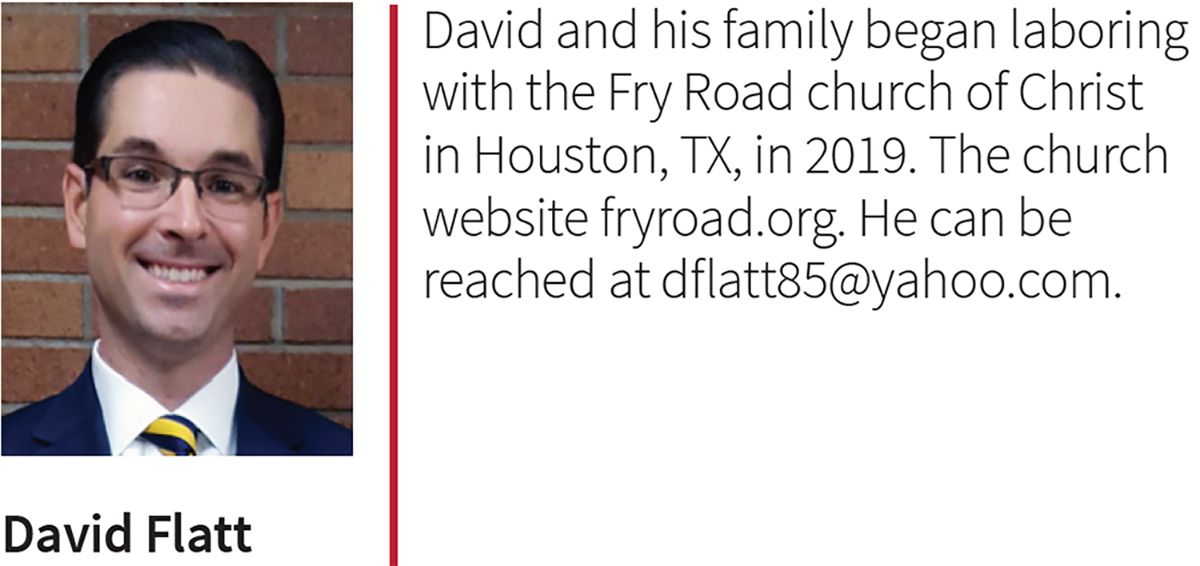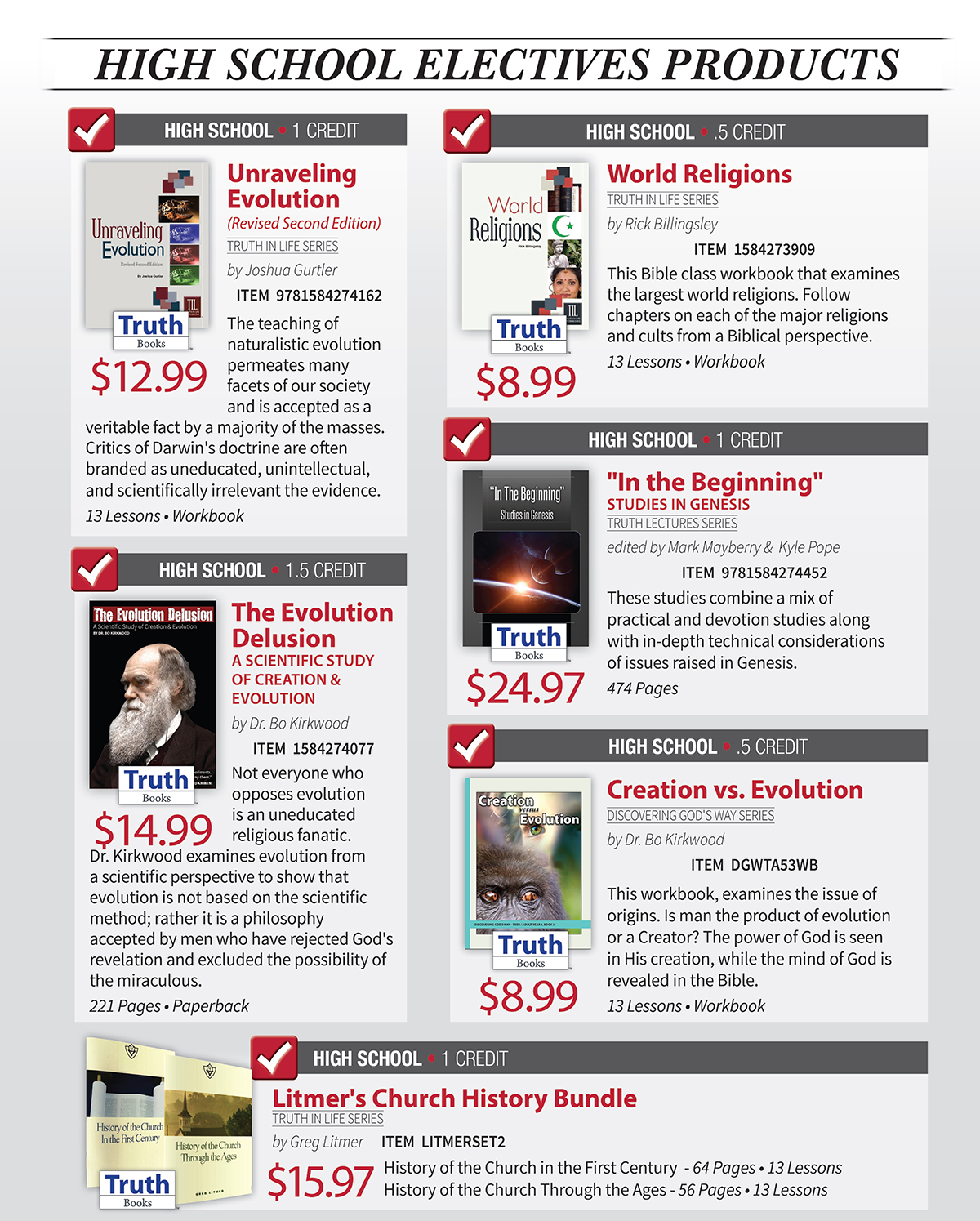
by David Flatt
Synopsis: Nearing the end of the Roman epistle, Paul concludes his overall thesis and comments upon his future plans.
As we near the end of our reflections upon Romans, let us consider Paul’s conclusion to his overall thesis and his plans for the future.
In the last half of Romans 15, Paul finishes the line of thought that he began in chapter 14: how to unite Jews and Gentiles to glorify the Creator with one voice. Saints were to receive one another as the family of God based on faith in Jesus, not personal opinions. Yet, Paul was not simply trying to settle disputes among the saints in Rome, but was seeking to accomplish something bigger. He explains how God’s vision for humanity is realized through faith in Jesus, the resurrected Lord, and ruler of heaven and earth. This text is the conclusion to Paul’s opening lines of the letter (Rom. 1:1-5, 16-17).
Bringing his masterpiece to a close, Paul emphasizes that God always intended to bring all nations of the world into His family. Paul cites several Old Testament prophecies to prove this had always been God’s plan. Consider the broader contexts of each of the passages cited.
“Therefore I will give thanks to You among the nations, O Lord, and I will sing praises to Your name” (Ps. 18:49). David wrote this psalm after being victorious over Saul. He would celebrate this victory not just with Israel, but “among the nations.”
“Rejoice, O nations, with His people; For He will avenge the blood of His servants, and will render vengeance on His adversaries, and will atone for His land and His people” (Deut. 32:43). Concluding the blessings and curses of Deuteronomy 29-32, Moses praises the Creator’s victories and calls for the nations to join Israel in worshiping Him.
“Praise the LORD, all nations; laud Him, all peoples! For His lovingkindness is great toward us, and the truth of the LORD is everlasting. Praise the LORD!” (Ps. 117:1-2). Quoting the first verse of this short psalm, Paul exhorts all nations to worship the Creator.
The last quotation Paul uses comes from Isaiah: “Then in that day the nations will resort to the root of Jesse, who will stand as a signal for the peoples; and His resting place will be glorious” (11:10). By citing this significant reference to the Messiah, Paul reconnects his readers to his epistle’s opening lines (Rom. 1:1-5).
In Isaiah 11, the prophet declares that a new branch would grow from an old root: the royal family of Jesse. Regarding this new branch, the Spirit of the LORD would be with Him. His rule would be different from that of other kings: His self-giving reign would bring justice to the poor; He would defend the meek. Also, Isaiah describes the peace of His kingdom: The lion and lamb would lie down together. Creation would live in harmony. He would gather all nations into His kingdom. In Romans 15:12, Paul quotes the tenth verse of Isaiah’s prophecy. This single passage encapsulates the gospel.
Jesus the Messiah was a descendant of Jesse, the father of David. Jesus was the rightful heir to Israel’s throne, biologically connected to the Messianic hope of Israel.
While the Hebrew term, ‘amad, rendered “stand,” has a wide range of translations, it was used to describe the concept of resurrection. Jesus once spoke of overthrowing the ruler of this world by being lifted up from the earth (John 12:31-32). God made Jesus King by the cross. He overthrew Satan by raising Jesus on the cross and raising Him from the dead. God declared that Jesus was His Son by the resurrection (Rom. 1:4).
God made Jesus King of heaven and earth by the cross and resurrection. Paul identifies Jesus as “our Lord.” While Caesar declared himself to be lord, saints recognize the Lord Jesus Christ. Additionally, Isaiah mentions the Messiah ruling “the people,” a clear reference to the Gentiles.
The Messiah becomes the hope of the Gentiles. Elsewhere, Paul asserts the Gentiles’ obedience to the gospel revealed the riches of God’s glory: Christ in you the hope of glory (Col. 1:27).
Having expounded these concepts in detail throughout the epistle, Paul concludes by emphasizing the purpose of believing the gospel: “Now the God of hope fill you with all joy and peace in believing, that ye may abound in hope, through the power of the Holy Ghost” (Rom. 15:13). By the Messiah and Spirit, God planned to rule the entire world by hope.
Many have sought to rule the world by hope; however, such slogans are always without substance. Worldly hope is nothing more than wishful thinking. The hope of which Paul writes is based on what God did for the world through Jesus Christ His Son. God’s hope is offered not by catchy slogans but by self-giving love. Genuine hope for the future is based on Jesus’s resurrection.
Through believeing and obeying the gospel, God fills us with joy and peace, and empowers us to begin living a life of faith. Despite obstacles, the Spirit causes us to flourish in hope. Such blessings are received by faith (Rom. 1:17).
Many consider Christians of the American Restoration Movement to have been pioneers of the gospel. These believers were met with many challenges and hardships in their labors to preach the gospel in the early American landscape’s rugged terrain. While such efforts should be respected, Paul was a true pioneer preacher, traveling to remote places on two continents to share the gospel with those who had not previously heard God’s saving message. The book of Acts documents his trials and tribulations of taking the gospel to the ancient world.
While we may view him as a pioneer, Paul viewed himself as a priest of the gospel. Priests offered sacrifices to God on behalf of the people. By preaching the gospel to Gentiles, Paul brought living sacrifices to God by their faith in the Messiah (Rom. 15:16).
Paul was aware that he was not the only one preaching the gospel in the world. Other apostles and priestly evangelists were active in proclaiming the good news. Paul was sensitive to the work of others. He did not want to preach where another had done the pioneering. He did not want to build on another’s foundation. Such is sensitive work and can lead to difficulties (1 Cor. 3:10-17). This is not to say that preaching where someone else laid a foundation of faith is wrong—on the contrary—it’s just not how Paul understood his calling. He was called to be a pioneer of the gospel to the Gentiles.
The pre-existing foundation of faith in Rome was partly why Paul had not yet visited the city. We don’t know when the gospel first came to the imperial city. Some think it resulted from the labors of Peter. Others believe that ordinary Christians, passing through the busy metropolis, planted the seeds of truth. We can only speculate.
Regardless, Paul explained why he wanted to come to Rome. As stated at the beginning of this epistle, Paul sought to visit for the sake of mutual encouragement (Rom. 1:10-13). Additionally, he anticipated a new phase in his pioneering work—hoping to take the gospel to Spain.
Geographically, Spain lay at the western edge of the known world. Rome would have been a logical base of operations for Paul in this endeavor. Previously, the Antioch congregation served in this capacity. Barnabas brought Paul to Antioch, where they labored together for a year (Acts 11:25-26). Afterward, Paul would begin and end missionary trips at this church (Acts 13:1–3; 14:26–28).
Did Paul ever reach Spain? The book of Acts closes with Paul teaching the gospel in Rome (Acts 28:30-31). However, there is no mention in the New Testament about Paul reaching Spain. Several years after Paul’s death, Clement writes about Paul traveling to the “farthest limits of the west” (1 Clement 5:5-6). Centuries later, Catholic traditions indicate that Paul came to Spain (John Chrysostom [347-407] and Jerome [347-420] mentions Paul being in Spain). While we cannot know for sure, we can appreciate Paul’s pioneering spirit. He was visionary, courageous, and resilient in taking the gospel to the world.
Before Paul could proceed with these plans, he needed to go to Jerusalem. They had been suffering from famine, and the apostle was determined to help them.
Paul had been raising money throughout his travels, but not for himself. He never solicited funds for himself and rarely accepted money from churches. No one could accuse him of being corrupted by money. Instead, he worked as a tentmaker to provide for himself. Paul was raising money for the saints in Jerusalem.
His fundraising efforts for these Jewish believers were an important component of his work. He frequently mentions this collection in his letters, noting that Macedonia and Achaia’s saints contributed to this relief effort. While Paul was well-intentioned, this work was sensitive. To appreciate this task, we should be careful to remember the history of the saints in Jerusalem and Paul’s complicated relationship with them (cf. Wright, 126-130).
First of all, recall the origin of the church in Jerusalem. This was where the gospel was first preached and obeyed (Acts 2). Subsequently, these new disciples took care of each other. By self-giving love, landowners sold their property and used the money to care for Christians: “And the multitude of them that believed were of one heart and of one soul: neither said any of them that ought of the things which he possessed was his own; but they had all things common” (Acts 4:32). Whatever assets were previously held by these saints were used. Years later, they needed assistance from saints abroad.
Paul did not create a system of communal living for churches throughout the ancient world. Rather, he encouraged Christians to provide for themselves by working and fulfilling their responsibilities of daily life. If they fell on hard times, other believers were to assist them.
Second, the saints in Jerusalem were uneasy about Paul, at least in the period immediately following his conversion. This was understandable. Earlier in his life, he persecuted them. Paul never forgot this fact. He frequently acknowledged the suffering he brought to the lives of Christians. Helping the Jerusalem saints was the least he could do—his contribution served as a peace offering for his sins of the past. In light of what happened in Jerusalem, this is a more sustainable model.
Third, Paul had previously faced strong opposition from certain saints in Jerusalem who did not understand that Christ’s gospel superseded the Mosaic code. Some came to Galatia, disrupting his work, insisting that the Gentiles submit to the Jewish ritual of circumcision (Gal. 2:12). Paul could have easily turned his back on the church in Jerusalem, from whence these brethren came, but he did not. Instead, he risked his life and the lives of his traveling companions by carrying large sums of money to help saints in Jerusalem.
Fourth, Paul viewed the need in Jerusalem as an opportunity to demonstrate unity between Jewish and Gentile Christians: non-Jewish believers would provide needed assistance to their Jewish brethren. While this sounds admirable, Paul would likely face opposition from some quarters. Generally speaking, his countrymen considered him a traitor to the Jewish nation. His very presence in Jerusalem would be unwelcomed. Also, some Jewish Christians might be uneasy about receiving help from him and Gentile disciples. How would the saints in Jerusalem react to Paul’s efforts? Time would tell.
People throughout the world may become part of God’s family by faith in Jesus. The Lord Jesus will rule the world as believers abound in the hope of eternal life. Like Paul, we must pioneer the gospel in the hearts of those who have not yet believed. We can begin with ourselves and expand westward to our families and communities.
How do saints face an uncertain future? Confidence in the future is augmented by focusing on today. Hope for the future is an outgrowth of living by faith in the present.
When we have the opportunity to help saints in need, we must act. Benevolence is a unifying exercise of faith. We help each other for the simple reason that we believe in Jesus. Benevolence is also a practical demonstration of the doctrinal theme of Romans. Instead of viewing justification by faith as a theological concept, may we recognize it is a way of life in God’s family. 
Wright, N.T. Paul for Everyone: Romans Part Two. Louisville, KY: Westminster: John Knox Press, 2004.



